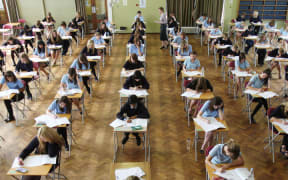For many college students, the academic year is beginning to crank up with NCEA internal assessments starting to come thick and fast.
So how can students best develop strong study skills? And how can parents support them to do so independently?

Photo: 123RF
Karen Boyes is a teacher, author, public speaker and CEO of Spectrum Education. She is a two-time winner of New Zealand Educator of the year.
Karen talked to Kathryn Ryan about starting the academic year with positive study habits.
Planning the year
Know when your assessments and how the year will pan out – use a wall chart to plan the year including assessments.
First year students need to understand the system: how many credits do they need? How many internals and how many externals?
“They need to be able to have that big picture and have a goal for the year.”
Put study strategies in place
Have a regular study time when you can review your notes at the end of the day.
If you’ve got five subjects, get five notebooks for each, she says.
“At the end of every day just summarise in one page what you did in that subject. That might take 20 minutes a day, but it’s such an easy thing.
“The brain loves to know at the end of the day what have I done and to be able to summarise it and read it the next day.”
Note taking
Good note taking is not writing down word-for-word what’s been said by a teacher, but being able to think about what’s being said and then summarising it.
This is not easy – listen to hints from the teacher, she says.
“Students often don’t know what’s important. Listen when the teacher says ‘this is important, make sure you’ve got this.’”
Karen suggests marking important points with a symbol. Or use colour.
“After you’ve had five or six subjects a day all that information is jumbled around and you need to go back to your notes and see what was important.”
Tips for parents
For reluctant children who find it hard to get going, break study down to manageable chunks.
“If they’re not getting into it, just give them 20 minutes and then take a 5 minute break.”
Sleep
“Teens need ideally 10 to 11 hours sleep - that’s a lot of sleep, 9 hours would be good but most of them aren’t even getting that.
“The rule in my house is 10pm, it doesn’t mean they have to be asleep but there’s no tech after ten.”
Study smart - top tips for exam revision
With a few weeks before NCEA exams, education consultant Karen Boyes has key tips for students heading into study leave. Audio


